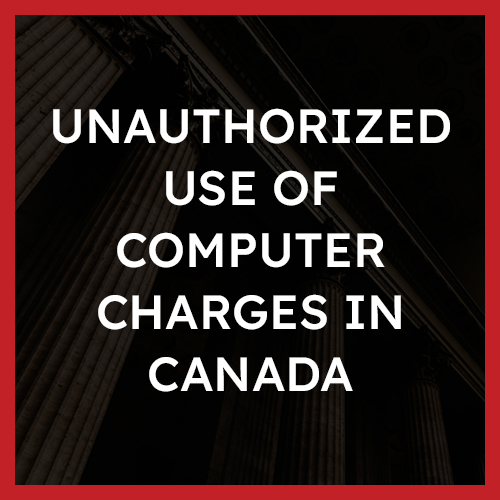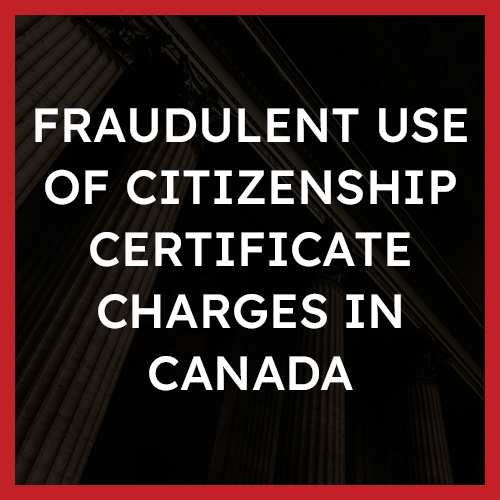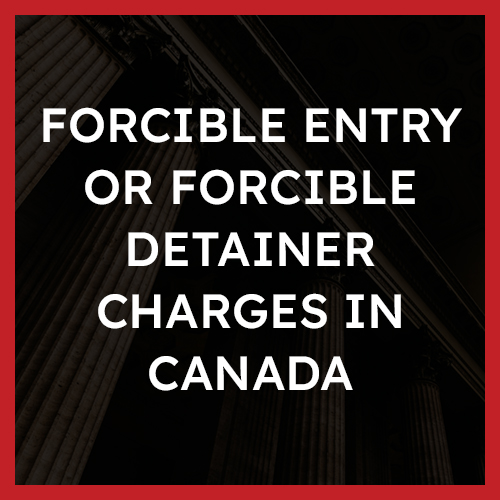Unauthorized Use of Computer (s. 342.1) Charges in Canada: Offences, Defences, Punishments
What is an unauthorized use of a computer charge?
 The unauthorized use of a computer is covered under s. 342.1 of the Criminal Code. Unauthorized use of a computer is found in Part IX of the Criminal Code which covers “Offences Against Rights of Property.”
The unauthorized use of a computer is covered under s. 342.1 of the Criminal Code. Unauthorized use of a computer is found in Part IX of the Criminal Code which covers “Offences Against Rights of Property.”
An unauthorized use of a computer charge occurs when a person fraudulently obtains any computer service, intercepts a computer system, used a computer system with the intent to commit an offence, or permits another person to have access to a computer password that would enable that person to commit an offence.
An unauthorized use of a computer charge is a hybrid offence with a Crown election. This means that depending on the circumstances of your case the Crown can elect to proceed by indictment or summarily. If an accused is prosecuted by indictment, there is a Defence election of court under s. 536(2) of the Criminal Code.
Examples
Some examples of an unauthorized use of a computer charge may include the following:
- Accessing policing systems without authorization;
- Accessing governmental computer systems without authorization;
- Stealing a computer or computer system to obstruct, interrupt, or interfere with the owner’s lawful use or enjoyment of that computer or computer system; and
- Giving someone a password to a computer so they could commit an offence.
Defences
The defences available against an unauthorized use of a computer charge are entirely dependent on the facts of your case.
However, some defences to an unauthorized use of a computer charge may include:
- The accused was wrongly identified as the person who committed the unauthorized use of a computer charge;
- The computer service the accused obtained was not prohibited to the accused;
- The accused did not engage in the act “fraudulently or without colour of right”; and
- The accused did not knowingly provide the password for the unauthorized use of a computer system to another person.
Punishment
An unauthorized use of a computer charge is a hybrid offence, which entails a maximum punishment as follows:
- Imprisonment for a term of not more than 10 years
Punishments for the unauthorized use of a computer depend on the circumstances of your case. Additionally, punishments also depend on if the Crown elects to pursue the charge as an indictable offence or summarily. There are no mandatory minimum penalties for this offence. The maximum is no more than 10 years of incarceration if prosecuted by indictment. If prosecuted summarily, the maximum punishment is no more than 6 months of incarceration and/or a $5,000 fine.
Overview of the Offence
According to s. 342.1 of the Criminal Code:
Unauthorized use of a computer
342.1 Everyone is guilty of an indictable offence and liable to imprisonment for a term of not more than 10 years, or is guilty of an offence punishable on summary conviction who, fraudulently and without colour of right,
- Obtains, directly or indirectly, any computer service;
- By means of an electro-magnetic, acoustic, mechanical or other device, intercepts or causes to be intercepted, directly or indirectly, any function of a computer system;
- Uses or causes to be used, directly or indirectly, a computer system with intent to commit an offence under paragraph (a) or (b) or under section 430 in relation to computer data or a computer system; or
- Uses, possesses, traffics in or permits another person to have access to a computer password that would enable a person to commit an offence under paragraph (a), (b) or (c).
Definitions
(2) In this section,
Computer data means representations, including signs, signals or symbols, that are in a form suitable for processing in a computer system;
Computer password means any computer data by which a computer service or computer system is capable of being obtained or used;
Computer program means computer data representing instructions or statements that, when executed in a computer system, causes the computer system to perform a function;
Computer service includes data processing and the storage or retrieval of computer data;
Computer system means a device that, or a group of interconnected or related devices one or more of which,
- Contains computer programs or other computer data, and
- By means of computer programs,
- Performs logic and control, and
- May perform any other function;
Electro-magnetic, acoustic, mechanical or other device means any device or apparatus that is used or is capable of being used to intercept any function of a computer system, but does not include a hearing aid used to correct subnormal hearing of the user to not better than normal hearing;
Function includes logic, control, arithmetic, deletion, storage and retrieval and communication or telecommunication to, from or within a computer system;
Intercept includes listen to or record a function of a computer system, or acquire the substance, meaning or purport thereof;
Traffic means, in respect of a computer password, to sell, export from or import into Canada, distribute or deal with in any other way.
Colour of Right
Colour of right is a defence to some property-related offences. It means that the accused has an honest belief that they had a right to possess the property but had no basis in fact or law for that belief.
The Guilty Act (Actus Reus)
The actus reus for an unauthorized use of computer charge under s. 342.1 is established by proof, beyond a reasonable doubt, of the following:
Fraudulently obtaining computer services s. 342.1(1)(a)
- The accused at a specified date and time, in the correct jurisdiction, obtained directly or indirectly a computer service;
- The computer service was prohibited to be accessed by the accused; and
- The accused did the prohibited act fraudulently and without colour of right.
Unauthorized interception of a computer system s. 342.1(1)(b)
- The accused at a specified date and time, in the correct jurisdiction, intercepts or causes to be intercepted, directly or indirectly, any function of a computer system;
- The interception was by means of an electro-magnetic, acoustic, mechanical, or other device; and
- The accused did the prohibited act fraudulently and without colour of right.
Obtaining a computer system with the intent for unauthorized use s. 342.1(1)(c)
- The accused at a specified date and time, in the correct jurisdiction, obtained, directly or indirectly, any computer system; and
- The accused did the prohibited act fraudulently and without colour of right.
Sharing passwords for unauthorized use of a computer system s. 342.1(1)(d)
- The accused at a specified date and time, in the correct jurisdiction, uses, possesses, traffics or permits another person to have access to a computer password; and
- The accused did the prohibited act fraudulently and without colour of right.
R v Woodward held that texting with a cell phone classifies as communicating “by means of a computer system” within the meaning of s. 342.1(2)
The Guilty Mind (Mens Rea)
The mens rea for an unauthorized use of a computer charge under s. 342.1 include proving, beyond a reasonable doubt, that:
Fraudulently obtaining computer services s. 342.1(1)(a)
- The accused knowingly obtained the computer service fraudulently; and
- A reasonable person in the same circumstances as the accused would have agreed that this was a dishonest act.
Unauthorized interception of a computer system s. 342.1(1)(b)
- The accused knowingly intercepted or caused to be intercepted any function of a computer system.
Obtaining a computer system with the intent for unauthorized use s. 342.1(1)(c)
- The accused intended to commit the offence created by s. 342(1)(a) or s. 342(1)(b) or s. 430.
Sharing passwords for unauthorized use of a computer system s. 342.1(1)(d)
- The accused knowingly permits another person to have access to a computer password; and
- The password “would enable a person to commit an offence under paragraph (a), (b) or (c)”.
Defences
How to Beat an Unauthorized use of a Computer Charge
Every case is different. The availability and strength of any defence depend entirely on the specific facts of your case. The strength of any available defence rests on the evidence against you and the precise details of the allegations. However, the following are some common defences that may be used when fighting an unauthorized use of a computer charge:
Factual innocence
A strong defence against an unauthorized use of a computer charge is to maintain that you are factually innocent. If you can show that the facts and the evidence do not support that you accessed a computer system or allowed someone to access a computer system without authorization, then you may be factually innocent.
Mistake in Identity
Depending on the circumstances of your case, a possible defence to an unauthorized use of a computer charge may be to raise an identity defence. In this case, for this defence to be raised successfully, you will have to prove that you were not the person who accessed a computer system without being authorized.
Colour of Right
If the accused had an honest but mistaken belief that they had a right to access the computer system that they were not authorized to access, then this may be a justified excuse for the offence. For this to be a defence you must show that you did not act dishonestly and in good faith.
Any applicable Charter defences
The Charter sets out your rights and freedoms before and after your arrest. If the police fail to abide by these rights deliberately or inadvertently, it could aid in your defence. If any of your Charter rights have been violated before or after your arrest, you may be able to have some or all of the evidence that the Crown is relying on to secure a conviction excluded under s. 24(2) of the Charter.
Punishments
The Criminal Code provides for a possible maximum term of 10 years imprisonment for those convicted of an unauthorized use of a computer charge.
Persons found guilty of the unauthorized use of a computer may be eligible for sentencing entailing a discharge, suspended sentence, stand-alone fine, custody, custody with a fine or probation, or a conditional sentence.
Frequently Asked Questions
Can you go to jail for the unauthorized use of a computer?
Yes, you can go to jail for the unauthorized use of a computer. If the Crown proceeds by indictment, the maximum jail time one can receive for the unauthorized use of a computer is 10 years. If the Crown proceeds summarily, the maximum jail time one can receive is 6 months.
Is the unauthorized use of a computer a serious offence?
The unauthorized use of a computer is a serious offence that can result in a convicted person spending up to 10 years in jail. This is a hybrid offence which allows the Crown to choose to proceed by indictment or summarily. Indictable offences are the most serious offences in the Criminal Code.
Even if the Crown chooses to proceed summarily, a conviction for the unauthorized use of a computer can have serious repercussions on your life affecting things like future employment and immigration.
Is the unauthorized use of a computer a summary or indictable offence?
The unauthorized use of a computer is known as a hybrid offence. This means that the Crown can elect to proceed either by indictment or summarily. If the Crown proceeds by indictment, a person convicted for the unauthorized use of a computer will face a maximum penalty of 10 years imprisonment. If the Crown proceeds summarily, the maximum jail time a person can receive for a conviction of the unauthorized use of a computer is 6 months.
Published Decisions
R v Cole, 2012 SCC 53 (CanLii)
The accused was a high-school teacher charged with possession of child pornography and the unauthorized use of a computer. When performing maintenance activities, a technician found on the accused’s laptop a hidden folder containing nude and partially nude photographs of a female student. The trial judge excluded all of the computer material due to Charter violations. The Court of Appeal held that the trial judge wrongly excluded this evidence and ordered a new trial. The Court of Appeal decision was appealed.
At the Supreme Court of Canada, the exclusionary order of the Court of Appeal was set aside and the order of a new trial was affirmed.
You can read the full decision here.
Manning v Canada (Citizenship and Immigration), 2022 CanLII 39877 (CA IRB)
The Minister argued that Ms. Manning should not be admitted to Canada due to a charge that occurred outside of Canada. Ms. Manning was charged with what was equivalent to the unauthorized use of a computer charge. It was held that Ms. Manning would not be admitted to Canada as she was unauthorized and objectively dishonest in her charge.
You can read the full decision here.
R v TELUS Communications Co., 2013 SCC 16 (CanLII)
TELUS Communications Company routinely made electronic copies of all text messages sent or received by subscribers and stores them on a computer database for a brief period of time. The police in this case obtained a warrant to obtain copies of any stored text messages sent or received by two subscribers. It was argued that this was an invasion of privacy and therefore, an unauthorized use of a computer.
You can read the full decision here.
About The Author
Ask A Question
We endeavor to respond to questions within 24 hours. If your matter is urgent, please call our office or submit a request for a free consultation.







